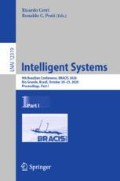Abstract
Among the existing techniques to improve the performance of metaheuristics in optimization problems, adaptive parameter control consists in varying one or more parameters of a given metaheuristic according to some indicator of the search conditions. This approach allows metaheuristics to change algorithmic behaviour during the search, and is particularly relevant for the optimization of dynamic problems. In this research we theoretically analyse in which ways the parameters of the ant colony optimization for continuous domains metaheuristic can be adapted, regarding how each parameter influences exploration and exploitation characteristics of the algorithm. Our experimental contributions include validating the colony success rate as a search condition estimator and choosing suitable maps from this estimator to the parameters q and \(\xi \) of the algorithm. Beyond that, we compare the performances of three proposed adaptive versions of the base metaheuristic and show the benefits of simultaneously adapting multiple parameters.
Access this chapter
Tax calculation will be finalised at checkout
Purchases are for personal use only
References
Abdelbar, A.M., Salama, K.M.: Parameter self-adaptation in an ant colony algorithm for continuous optimization. IEEE Access 7, 18464–18479 (2019)
Bartz-Beielstein, T.: Evolution strategies and threshold selection. In: Blesa, M.J., Blum, C., Roli, A., Sampels, M. (eds.) HM 2005. LNCS, vol. 3636, pp. 104–115. Springer, Heidelberg (2005). https://doi.org/10.1007/11546245_10
Boussaïd, I., Lepagnot, J., Siarry, P.: A survey on optimization metaheuristics. Inf. Sci. 237, 82–117 (2013)
Chusanapiputt, S., Nualhong, D., Jantarang, S., Phoomvuthisarn, S.: Selective self-adaptive approach to ant system for solving unit commitment problem. In: Proceedings of the 8th Annual Conference on Genetic and Evolutionary Computation, pp. 1729–1736 (2006)
Costa, V.O.: Bank of metaheuristics (2020). https://github.com/vctrop/bank_of_metaheuristics/tree/BRACIS2020
Eiben, Á.E., Hinterding, R., Michalewicz, Z.: Parameter control in evolutionary algorithms. IEEE Trans. Evol. Comput. 3(2), 124–141 (1999)
Favaretto, D., Moretti, E., Pellegrini, P.: On the explorative behavior of MAX–MIN ant system. In: Stützle, T., Birattari, M., Hoos, H.H. (eds.) SLS 2009. LNCS, vol. 5752, pp. 115–119. Springer, Heidelberg (2009). https://doi.org/10.1007/978-3-642-03751-1_10
Fortin, F.A., De Rainville, F.M., Gardner, M.A., Parizeau, M., Gagné, C.: DEAP: evolutionary algorithms made easy. J. Mach. Learn. Res. 13, 2171–2175 (2012)
Hoos, H.H.: Automated algorithm configuration and parameter tuning. In: Hamadi, Y., Monfroy, E., Saubion, F. (eds.) Autonomous Search, pp. 37–71. Springer, Heidelberg (2011). https://doi.org/10.1007/978-3-642-21434-9_3
Huang, C., Li, Y., Yao, X.: A survey of automatic parameter tuning methods for metaheuristics. IEEE Trans. Evol. Comput. 24, 201–216 (2019)
Karafotias, G., Hoogendoorn, M., Eiben, Á.E.: Parameter control in evolutionary algorithms: trends and challenges. IEEE Trans. Evol. Comput. 19(2), 167–187 (2014)
Li, Z., Wang, Y., Yu, J., Zhang, Y., Li, X.: A novel cloud-based fuzzy self-adaptive ant colony system. In: 2008 Fourth International Conference on Natural Computation, vol. 7, pp. 460–465. IEEE (2008)
Liao, T., Montes de Oca, M.A., Aydin, D., Stützle, T., Dorigo, M.: An incremental ant colony algorithm with local search for continuous optimization. In: Proceedings of the 13th Annual Conference on Genetic and Evolutionary Computation, pp. 125–132 (2011)
Martins, T., Sato, A., Tsuzuki, M.: Adaptive neighborhood heuristics for simulated annealing over continuous variables. INTECH Open Access Publisher (2012)
Nickabadi, A., Ebadzadeh, M.M., Safabakhsh, R.: A novel particle swarm optimization algorithm with adaptive inertia weight. Appl. Soft Comput. 11(4), 3658–3670 (2011)
Oliphant, T.E.: A Guide to NumPy, vol. 1. Trelgol Publishing, USA (2006)
Omran, M., Polakova, R.: A memetic and adaptive continuous ant colony optimization algorithm. In: Aliev, R.A., Kacprzyk, J., Pedrycz, W., Jamshidi, M., Babanli, M.B., Sadikoglu, F.M. (eds.) ICSCCW 2019. AISC, vol. 1095, pp. 158–166. Springer, Cham (2020). https://doi.org/10.1007/978-3-030-35249-3_20
Poláková, R., Tvrdík, J., Bujok, P.: Adaptation of population size according to current population diversity in differential evolution. In: 2017 IEEE Symposium Series on Computational Intelligence (SSCI), pp. 1–8. IEEE (2017)
Socha, K., Dorigo, M.: Ant colony optimization for continuous domains. Eur. J. Oper. Res. 185(3), 1155–1173 (2008)
Stützle, T., et al.: Parameter adaptation in ant colony optimization. In: Hamadi, Y., Monfroy, E., Saubion, F. (eds.) Autonomous Search, pp. 191–215. Springer, Heidelberg (2011). https://doi.org/10.1007/978-3-642-21434-9_8
Wilcoxon, F., Katti, S., Wilcox, R.A.: Critical values and probability levels for the wilcoxon rank sum test and the wilcoxon signed rank test. Sel. Tables Math. Stat. 1, 171–259 (1970)
Yang, Q., et al.: Adaptive multimodal continuous ant colony optimization. IEEE Trans. Evol. Comput. 21(2), 191–205 (2016)
Zhang, J., et al.: A survey on algorithm adaptation in evolutionary computation. Front. Electr. Electron. Eng. 7(1), 16–31 (2012)
Author information
Authors and Affiliations
Corresponding author
Editor information
Editors and Affiliations
Rights and permissions
Copyright information
© 2020 Springer Nature Switzerland AG
About this paper
Cite this paper
Costa, V.O., Müller, F.M. (2020). On the Multiple Possible Adaptive Mechanisms of the Continuous Ant Colony Optimization. In: Cerri, R., Prati, R.C. (eds) Intelligent Systems. BRACIS 2020. Lecture Notes in Computer Science(), vol 12319. Springer, Cham. https://doi.org/10.1007/978-3-030-61377-8_12
Download citation
DOI: https://doi.org/10.1007/978-3-030-61377-8_12
Published:
Publisher Name: Springer, Cham
Print ISBN: 978-3-030-61376-1
Online ISBN: 978-3-030-61377-8
eBook Packages: Computer ScienceComputer Science (R0)

